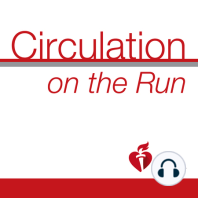17 min listen
Circulation February 04, 2020 Issue
ratings:
Length:
27 minutes
Released:
Feb 3, 2020
Format:
Podcast episode
Description
Dr Carolyn Lam: Welcome to Circulation on the Run, Your Weekly Podcast Summary and Backstage Pass to The Journal and its Editors. I'm Dr Carolyn Lam, Associate Editor from the National Heart Centre and Duke National University of Singapore. Dr Greg Hundley: And I'm Dr Greg Hundley, Director of the Pauley Heart Center at VCU Health in Richmond, Virginia. Dr Carolyn Lam: Greg, this issue is full of super interesting papers, many of which were presented as late-breaking presentations at the American Heart Association, like the feature paper that sacubitril/valsartan across the spectrum of ejection fraction in heart failure, where this was really analyzed across the landmark PARADIGM and PARAGON trials. I'm sure everyone's looking forward to hearing about it, but before we talk about that, I want to share some more very interesting results from a very important trial, the REDUCE-IT trial. So, as some background, some trials have found that patients from the United States derive less benefit than patients enrolled outside the United States. And this was the reason that there was a pre-specified subgroup analysis of the REDUCE-IT trial, which really is the reduction of cardiovascular events with icosapent ethyl-intervention trial, and this analysis was conducted to determine the degree of benefit of icosapent ethyl in the United States. So, Greg, do you remember what the REDUCE-IT trial was about? Dr Greg Hundley: Well, Carolyn, I think REDUCE-IT randomized 8,179 statin-treated patients with triglycerides between 135 and 500 milligrams per deciliter and LDL cholesterol levels between 40 and 100 milligrams per deciliter and a history of atherosclerosis or diabetes to Icosapent Ethyl, four grams per day or placebo. And the primary endpoint, I believe, was cardiovascular death, nonfatal myocardial infarction, non-fatal stroke, coronary revascularization or hospitalization for unstable angina. Hah! Dr Carolyn Lam: Wow, Greg, you pass that quiz, like maybe you had a cheat sheet answer. Dr Greg Hundley: All right, Carolyn, tell us now what did REDUCE-IT USA find? Dr Carolyn Lam: This was from a corresponding author, Dr Deepak Bhatt, from Brigham and Women's Hospital Heart and Vascular Center, and his colleagues and they found that in the United States Icosapent Ethyl at four grams a day produced large and significant reductions in multiple ischemic endpoints including cardiovascular death, myocardial infarction, stroke, coronary revascularization, and hospitalization for unstable angina. Furthermore, REDUCE-IT US demonstrated that Icosapent Ethyl provided a statistically significant 30% relative risk reduction and a 2.6% absolute risk reduction in all-cause mortality. The risk benefit profile of Icosapent Ethyl was highly favorable with an overall safety and tolerability profile virtually identical to placebo. Dr Greg Hundley: Wow, Carolyn. So, this does have important implications for us in the US, very nice. Thank you for that lovely quiz. So, Carolyn, I'm going to switch now and talk about a paper from Roddy Walsh from Amsterdam in the Netherlands. In this study, the investigators defined the frequency of rare variation in 2,538 patients with dilated cardiomyopathy across protein-coding regions of 56 commonly tested genes and compared this to both 912 confirmed healthy controls and a reference population of 60,706 individuals to identify clinically interpretable genes robustly associated with dominant monogenetic dilated cardiomyopathy. Dr Carolyn Lam: Wow, wow. That's a huge study. So what did they find? Dr Greg Hundley: Okay, Carolyn. So overall rare variants in 12 genes potentially explain 17% of cases in the outpatient clinical cohort representing a broad range of adult patients with dilated cardiomyopathy and 26% of cases in the diagnostic referral cohort enriched in familial and early onset dilated cardiomyopathy. And so, practically speaking, by analyzing two dilated cardiomyopathy cohorts with distinctive patient profiles, the
Released:
Feb 3, 2020
Format:
Podcast episode
Titles in the series (100)
Circulation January 24, 2017 Issue: Circulation Weekly: Your Weekly Summary & Backstage Pass To The Journal by Circulation on the Run
